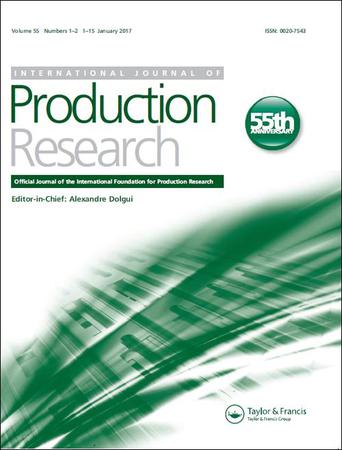考虑延迟的不相关并行多目标分布式混合流水车间调度的多种群贪婪作业插入厂间邻域遗传算法
IF 7.3
2区 工程技术
Q1 ENGINEERING, INDUSTRIAL
International Journal of Production Research
Pub Date : 2023-09-26
DOI:10.1080/00207543.2023.2262616
引用次数: 0
摘要
摘要分布式制造正逐渐成为未来的发展趋势。激烈的市场竞争使得制造企业关注生产效率和产品交付。混合流水车间调度问题是制造业中常见的问题。考虑到同一阶段机器的差异性,以最小完工时间和总延迟为条件,研究了具有不相关并行机器的多目标分布式混合流水车间调度问题。针对MODHFSP-UPM,提出了一种改进的多种群遗传算法(IMPGA)。邻域结构是基于元启发式求解算法的关键。为了保证局部搜索的效率,设计了贪婪工作插入工厂间邻域和相应的移动评估方法。为了提高IMPGA的优化能力和稳定性,分别设计了多种群间的分区域协同进化和基于概率抽样的再初始化过程。在计算实验中,随机生成120个实例(包括相同比例的中型和大规模问题)。IMPGA在所有指标(扩散、代距离和倒代距离)上表现最好,明显优于现有的MODHFSP-UPM高效算法。最后,该方法有效地解决了一个聚酯薄膜制造案例,使完工时间和总延误时间分别减少了40%和60%。关键词:不相关并行机的分布式混合流水车间考虑总延迟的多目标调度改进多种群遗传算法贪婪作业插入厂间邻域厂间邻域快速评价方法多种群间的分区域协同进化披露声明作者未报道潜在利益冲突。项目资助:国家自然科学基金项目(no . 51825502, no . U21B2029)。崔尚豪,博士,2021年毕业于华中科技大学工业工程专业,硕士学位。他目前在华中科技大学攻读机械工程博士学位。主要研究方向为智能优化算法及其在车间调度中的应用。李新宇,2009年毕业于华中科技大学工业工程专业,获博士学位。现任华中科技大学机械科学与工程学院工业与制造系统工程系、数字化制造装备与技术国家重点实验室教授。他发表了100多篇论文。主要研究方向为智能调度、机器学习等。高亮,2002年毕业于华中科技大学机电工程专业,获博士学位。现任华中科技大学机械科学与工程学院工业与制造系统工程系、数字化制造装备与技术国家重点实验室教授。他发表了470多篇论文。主要研究方向为运筹学与优化、调度、大数据、机器学习等。高教授是《工业与生产工程》杂志《群与进化计算》的副主编。他是IET协同与智能制造的联合主编。张春江,2011年获华中科技大学工业工程学士学位,2016年获华中科技大学工业工程博士学位。现任华中科技大学讲师。他目前的研究兴趣包括进化算法、约束优化、多目标优化及其在生产调度中的应用。本文章由计算机程序翻译,如有差异,请以英文原文为准。
Multi-population genetic algorithm with greedy job insertion inter-factory neighbourhoods for multi-objective distributed hybrid flow-shop scheduling with unrelated-parallel machines considering tardiness
AbstractDistributed manufacturing is gradually becoming the future trend. The fierce market competition makes manufacturing companies focus on productivity and product delivery. The hybrid flow shop scheduling problem (HFSP) is common in manufacturing. Considering the difference of machines at the same stage, the multi-objective distributed hybrid flow shop scheduling problem with unrelated parallel machines (MODHFSP-UPM) is studied with minimum makespan and total tardiness. An improved multi-population genetic algorithm (IMPGA) is proposed for MODHFSP-UPM. The neighbourhood structure is essential for meta-heuristic-based solving algorithms. The greedy job insertion inter-factory neighbourhoods and corresponding move evaluation method are designed to ensure the efficiency of local search. To enhance the optimisation ability and stability of IMPGA, sub-regional coevolution among multiple populations and re-initialisation procedure based on probability sampling are designed, respectively. In computational experiments, 120 instances (including the same proportion of medium and large-scale problems) are randomly generated. The IMPGA performs best in all indicators (spread, generational distance, and inverted generational distance), significantly outperforming existing efficient algorithms for MODHFSP-UPM. Finally, the proposed method effectively solves a polyester film manufacturing case, reducing the makespan and total tardiness by 40% and 60%, respectively.KEYWORDS: Distributed hybrid flow shop with unrelated parallel machinesMulti-objective scheduling considering total tardinessImproved multi-population genetic algorithmGreedy job insertion inter-factory neighbourhoodsRapid evaluation method for inter-factory neighbourhoodsSub-regional coevolution among multiple populations Disclosure statementNo potential conflict of interest was reported by the author(s).Additional informationFundingThis work is supported by the National Natural Science Foundation of China under Grant 51825502 and U21B2029.Notes on contributorsHanghao CuiHanghao Cui received the master’s degree in industrial engineering from Huazhong University of Science and Technology, Wuhan, China, 2021. He is currently pursuing the Ph.D. degree in mechanical engineering with the Huazhong University of Science and Technology. His research interests are in intelligent optimisation algorithms and their application to shop scheduling.Xinyu LiXinyu Li received the Ph.D. degree in industrial engineering from Huazhong University of Science and Technology (HUST), China, 2009. He is a Professor of the Department of Industrial & Manufacturing Systems Engineering, State Key Laboratory of Digital Manufacturing Equipment & Technology, School of Mechanical Science & Engineering, HUST. He had published more than 100 refereed papers. His research interests include intelligent scheduling, machine learning etc.Liang GaoLiang Gao received the Ph.D. degree in mechatronic engineering from Huazhong University of Science and Technology (HUST), China, 2002. He is a Professor of the Department of Industrial & Manufacturing System Engineering, State Key Laboratory of Digital Manufacturing Equipment & Technology, School of Mechanical Science & Engineering, HUST. He had published more than 470 refereed papers. His research interests include operations research and optimisation, scheduling, big data and machine learning etc. Prof. GAO is an Associate Editor of Swarm and Evolutionary Computation, Journal of Industrial and Production Engineering and. He is co-Editor-in-chief of IET Collaborative and Intelligent Manufacturing.Chunjiang ZhangChunjiang Zhang received the B.Eng. and Ph.D. degrees in industrial engineering from Huazhong University of Science and Technology (HUST), Wuhan, China, in 2011 and 2016, respectively. He is currently a lecturer with HUST. His current research interests include evolutionary algorithms, constrained optimisation, multi-objective optimisation, and their applications in production scheduling.
求助全文
通过发布文献求助,成功后即可免费获取论文全文。
去求助
来源期刊

International Journal of Production Research
管理科学-工程:工业
CiteScore
19.20
自引率
14.10%
发文量
318
审稿时长
6.3 months
期刊介绍:
The International Journal of Production Research (IJPR), published since 1961, is a well-established, highly successful and leading journal reporting manufacturing, production and operations management research.
IJPR is published 24 times a year and includes papers on innovation management, design of products, manufacturing processes, production and logistics systems. Production economics, the essential behaviour of production resources and systems as well as the complex decision problems that arise in design, management and control of production and logistics systems are considered.
IJPR is a journal for researchers and professors in mechanical engineering, industrial and systems engineering, operations research and management science, and business. It is also an informative reference for industrial managers looking to improve the efficiency and effectiveness of their production systems.
 求助内容:
求助内容: 应助结果提醒方式:
应助结果提醒方式:


